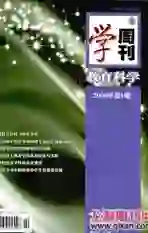定语从句学习法可行性研究
2009-06-04马宝忠
马宝忠
定语从句的主要功能是作名词修饰语(即“定语”)。它与先行项的语义关系分为限制性定语从句(Restrictive Attributive Clause)和非限制性定语从句(Non-restritive Attributive Clause)。或者把这种从句叫做形容词从句或关系分句。它在句中修饰名词或代词。被定语从句修饰的词叫先行词,区别定语从句和名词性从句的最简易的办法就是看从句前有无被修饰的先行词。引导定语从句的有:
关系代词:先行词为人的用:who, whom, that, whose
先行词为物的有:which, that, whose
关系副词:when, where, why
注意:引导定语从句的关系词和引导名词性从句的连接词有许多是共用的,但它们在从句中的作用有所不同,注意区别。尤其要注意的是what只能引导名词性从句,不能引导定语从句。定语从句一般紧跟在先行词之后,但有时也被一个短语隔开。可以把它叫做隔位定语从句,例如:
I was the only person in my office who was invited.
一、关系代词和关系副词的一般用法
关系代词在从句中充当主语、宾语或表语等成分,应注意的一点是关系代词充当宾语、表语时可以省略,例如:
Heres a fellow who just walks into a bank and helps himself to so much money. (作主语)
Hes no longer the man (that) he used to be. (作表语)
This is the book (that/which) I referred to in my talk. (作宾语)
△whose 在定语从句中置名词之前,充当定语,既可指人,又可指物。
Whose ×× = the ×× of which /whom
例如:
Please pass me the dictionary whose cover is black. (指物)=Please pass me the dictionary the cover of which is black.
The doctor, whose name was Johnson, lived in a small town in the north of England. (指人)=The doctor, the name of whom was Johnson, lived in a small town in the north of England.
△关系副词when, where, why在从句中充当状语,分别可表示时间、地点或原因。例如:
I will never forget the day when I first came to Beijing.
This is the house where I once lived.
The teacher knows the reason why the didnt turn up.
注意:关系副词在定语从句中通常是不可以省略的,但在下列情况中例外:
1、当先行词是way(方式)时,表示方式的关系副词how可省略。
Thats not the way you treat your teacher.
2、先行词是time(时间)时,表示时间的关系副词when可省略。
This film doesnt mention the time the war broke out.
3、当先行词是place(地点)时,表示地点的关系副词where可省略。
This is the place you were born.
4、当先行是reason(原因)时,表示原因的关系副词why可省略。
That is the reason I didnt phone you.
△先行词是the way时,其后的定语从句关系有三种,例如:
I like the way (in which / that) you theach us English.
△如何确定使用关系代词还是关系副词的关键是看从句缺少的是主语、宾语还是状语,试比较:
I will never forget the day (which/ that) I spent in GuangZhou. (spent是及物动词,后缺宾语,因此应使用关系代词或者省略)
I wil never forget the day when HongKong returned to its motherland.(从句主谓结构完整,缺状语,因此用关系副词)
△介词+关系代词which等于关系副词,例如:
I will never forget the day on which HongKong returned to its motherland. (on which=when)
The reason for which he didnt come to school yesterday isnt believable. (for which=why)
This is the house in which LuXun once lived. (in which = where)
△介词+关系代词的用法
关系代词紧跟在介词后面时,不能用that,也不能省略,常用which或whom。介词的选用要注意两个方面的问题。
1、介词与先行词的搭配,构成介词短语。
The map shows the direction in which the enemy would retreat .( in the direction )
English is a useful tool with which we can commucnicate with English-speaking people.(with the tool)
There is a train by which you can go back to your hometown.(by train)
Life is a large stage on which we can show al our talents.(on the stage)
In the middle of the room was a large bed under which the policeman found a gun.
2、介词与定语从句中的动词搭配,构成动词短语。
They are talking about the game for which I do not care at all. (care for sth.)
This is the matter to which we should pay much attention. ( pay attention to )
Smoking is a bad habit of which Im trying to get rid. ( get rid of )
Thats not the reply to which we are looking forward. ( look forward to )
The man about whom I talked at the meeting is from Beijing university. ( talk about sb)
注意:遇固定词组时,介词一般紧跟主体,不作前置。如:
Is this the pen ( that / which ) you are looking for? (这里介词for一般不提前,因为look for是固定词组,意为“寻找”,介词for若被提前,单个的look意为“看”,不符合句意。)
二、限制性定语从句与非限制性定语从句
△限制性定语从句对先行词起限定作用,去掉后句意就变得不明确,它与主句之间没有逗号分隔。例如:
This is a shop that sells mp4.
The story-book that I boupht yesterday is very interesting.
△非限制性定语从句与主句之间的关系相对松散一些,它对先行词起被充说明作用,去掉后不影响主句意思。这类从句与主句之间有逗号隔开。例如:
We are all proud of the Great Wall, which is one of the man-made wonders of the world.
My father, who is a teacher, often encourages me to study well.
△在非限制性定语从句中,有时根据句子意思,常把some, any, none, all, both, several, many, most, neither, either等词与of whom 或of which连用。
I have fire best friends, three of whom live in shanghai.
We have tested two hundred types of boots, none of which is / are completely water proof.
三、关系代词的一些特定用法。
指物时,关系代词that和which一般情况下可换用,但在以下几种情况下一般用that,而不用which:
1、先行词是much, little, few, none, nothing, anything, something, everything, all等不定代词或是先行词被all, every, some, any, no, few, little等修饰时:
Is there anything (that) I can do for you in town?
I have read all the books (that) you gave me.
但当something确指某物或某事时,用that或which 都可以,如:
Theres somethng that / which keeps worrying me.
2、先行词被形容词最高级或有序数词the first, the second…,the last修饰时:
The first goal that Ill achieve is to go to university.
This is the best film (that) I have ever seen.
3、先行词被the only, the very 修饰时:
This is the very book (that) Ive been looking for.
The only thing that matters is to find our way home.
4、当先行词既有人又有物时:
They talked about the persons and things (that) they remembered in the school.
5、当主句是由who或which 引导的特殊问句时,为避免重复,定语从句中常用that.
Who is the boy that is sitting on the desk?
Which is the book (that) you bought yesterday?
△当先行词是anyone, those, he, she等代词表示“人”时,一般用who而不用that。
Those who drink water think water.
He who doesnt reach the Great Wall is not quite a man.
四、定语从句中的as与which的异同。
1、as引导的限制性定语从句:
当先行词有the same, such, as, so修饰时,要用as代替who(m),which 或that引导定语从句:
He will marry as pretty a girl as he can find.
Id like to have the same books as one used in your school.
2、as引导的非限制性定语从句可以放在主句前面,插在主句中间或放在主句末尾,而which引导的非限制性定语从句只能放在主句后面,例如:
As anybody can see, the elephant is like a snake.
=The elephant, as anybody can see, is like a snake.
=The elephant is like a snake, as anybody can see.
3、as引导的从句有“正如”、“正像”之意,而which则无此意。常用句型有:as weall known, as is known to all, as anybody can see, as is expected等。如:
As we all know, paper was first made in China.
4、若主句与从句内容不一致,或从句对主句内容起反对、排斥、否定等作用时,多用which,而as只能用于主句和从句内容一致时:
She has married again, as was expected.
She has married again, which was unexpected.
